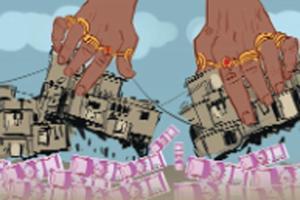This imagination comes together in the resounding climax, where a multi-coloured, self-confident celebration of Dalit history, politics and life worlds, shot aerially, finally create a new urban plan image, suggest a possible new world

Illustration/Uday Mohite
 There are so many amazing things about the film Kaala, but most significant is that it is a film about social injustice which simply refuses to be tragedy, offering instead a vital, pleasurable, liberatory politics. Every traditional filmic moment of social tragedy is overturned through joyful affirmation. When a woman says, "the builders are trying to kill us slowly, we may as well die in one go" Kaala responds: why should we die? Life is bigger than death. We will live.
There are so many amazing things about the film Kaala, but most significant is that it is a film about social injustice which simply refuses to be tragedy, offering instead a vital, pleasurable, liberatory politics. Every traditional filmic moment of social tragedy is overturned through joyful affirmation. When a woman says, "the builders are trying to kill us slowly, we may as well die in one go" Kaala responds: why should we die? Life is bigger than death. We will live.
ADVERTISEMENT
Kaala is about how caste works at every level — material, emotional, philosophical — told through the relationship of Dharavi, a thriving but neglected, Dalit settlement and a Bombay, traditionally a city of transactions and accommodations, wanting to recast itself in a new 'swaccha' avatar. In one face-off, Nana Patekar's developer-character says to Rajanikanth's: Kaala — the name, the colour, so ugly, it hurts the eye. Kaala simply says: What a pathetic mindset. If you saw our world with better eyes, what seems dirty to you, will reveal itself as vibrant, manicoloured. A moment where social humiliation would be filmically replayed is transformed into an analysis of a gaze. And Kaala, in content and form simply refuses to accept any gaze but its own, a Dalit point of view on a Dalit life-world and history, and thus, asks you to change the way you see.
Thereby it reverses assumptions about black and white, legitimate and illegitimate and reveals what is being presented as pure and clean to the country, as fundamentally violent and sterile. The film repeatedly zooms into Dharavi through aerial shots, where the life burst out of the lifeless world of urban plans and data, with force and colour. Attraction and romance are taken for granted here. Men are asked to cook. Rappers burst into song at happy moments and sad ones. Children stay up past bedtime. Generations co-exist with manageable levels of emotional blackmail. Bodies are real, varied, not synthetically homogenous. There is self-confidence, a sense of justice, respect. Rajanikanth's lost love reappears and everyone is amused. It is not a threat to marriage, but a thread of life. This is a world people have built, which they should be able to re-design, yaniki redevelop, on their terms.
There is a kind of swachhata abhiyan in films where the traditional Indian mainstream film is repeatedly described as an inferior, messy form — not to be redeveloped as we like, but rather to be replaced by a "superior" neat, character-driven, three act structure, where songs appear "logically", not to unleash pleasure and emotion. In this context, the term "gritty realism" is frequently used to indicate that a film is politically progressive because it dares to enter the threatening world of the underbelly, without altering how we see the "underbelly", thus maintaining the social order.
Kaala, joyfully shrugs off these frameworks. It combines the mainstream entertainer, the juxtapositional symbolism of agit-prop documentary, didactic narration of political history, shaping form to what it wants to say, instead of submitting to pre-existing formal structures. Forms are not hierarchically separated but combine to imbue each other with meaning, representing a new imagination. Because how can there be a new reality without a new imagination? This imagination comes together in the resounding climax, where a multi-coloured, self-confident celebration of Dalit history, politics and life worlds, shot aerially, finally create a new urban plan image, suggest a possible new world.
Paromita Vohra is an award-winning Mumbai-based filmmaker, writer and curator working with fiction and non-fiction. Reach her at www.parodevipictures.com
Catch up on all the latest Crime, National, International and Hatke news here. Also download the new mid-day Android and iOS apps to get latest updates
 Subscribe today by clicking the link and stay updated with the latest news!" Click here!
Subscribe today by clicking the link and stay updated with the latest news!" Click here!







